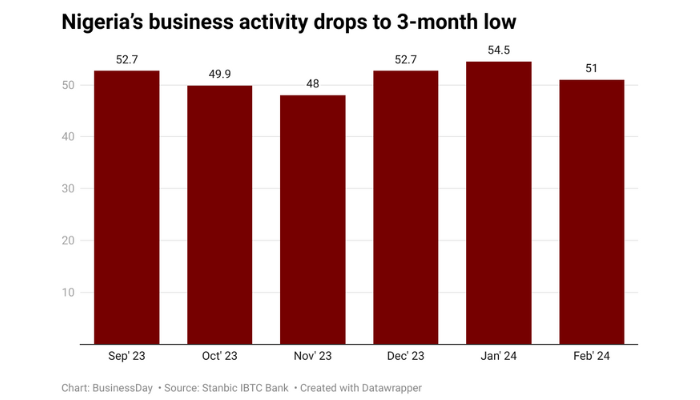Business activity in Nigeria dropped to the lowest in three months in February 2024 largely on the back of the weakness of the naira, a new Purchasing Managers’ Index (PMI) has shown
The latest monthly PMI by Stanbic IBTC Bank released on Friday showed the headline index declined to 51.0 last month from 54.5 in January. Readings above 50.0 signal an improvement in business conditions, while those below show deterioration.
“Price pressures intensified in the Nigerian private sector during February and were unprecedented in over a decade of data collection. Both input costs and output prices increased at the sharpest rates on record, with rising prices impacting demand,” the index report said.
It said as a result, rates of expansion in output and new orders slowed sharply over the month, while employment decreased for the first time in ten months.
“Meanwhile, business confidence dropped to the lowest on record. Input costs surged higher in February, often as a result of exchange rate weakness, which drove up material costs, but also higher fuel prices,” it added.
According to the report, the latest rise in overall input costs was by far the sharpest since the survey began in January 2014, with around 78 percent of respondents signaling an increase over the month.
The PMI index, which measures the performance of the private sector, is derived from a survey of 400 companies from agriculture, manufacturing, services, construction and retail sectors.
It is a composite index based on five individual indexes with the following weights: new orders (30 percent), output (25 percent), employment (20 percent), suppliers’ delivery times (15 percent), and stock of items purchased (10 percent), with the delivery times index inverted so that it moves in a comparable direction.
“Similarly, output price inflation also hit a fresh record high in February as firms passed through rising input costs to their customers. Steep price pressures acted to limit new orders in the private sector,” authors of the report said.
They added that although new business increased for the third successive month amid some positive signs for underlying demand, the rate of expansion slowed sharply and was the weakest in this sequence.

